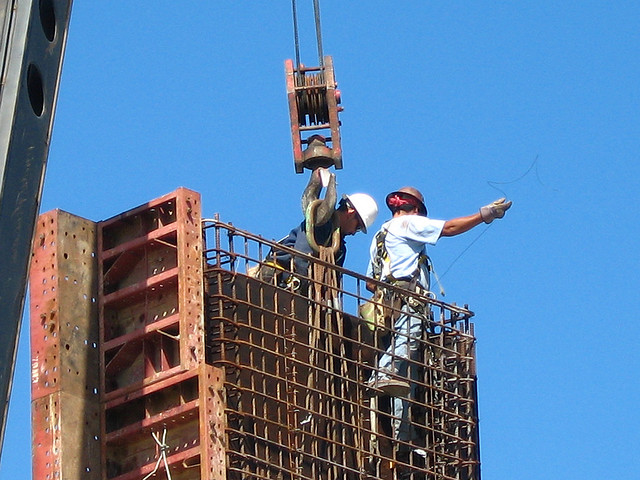You may have heard a lot about them lately: Olivia Chow has made them the central plank of her youth employment platform, Premier Kathleen Wynne has been celebrating them, and the term was bounced around at the Unifor-led Good Jobs Summit. But what is a Community Benefit Agreement?
Community Benefit Agreements (or CBA’s) are contracts which leverage a development project to meet a broader range of policy objectives such as equity, poverty reduction, environmental sustainability and local economic development.
In their most common form, CBA’s are tacked on to publicly funded infrastructure projects to ensure that the communities affected by the development receive more social and economic value from the project.
Put simply, CBAs are “a way of getting the most out of infrastructure dollars,” as Steve Shallhorn, director of the Toronto Community Benefits Network, explained at the Good Jobs on October 3.
The social benefit of CBA’s often comes in the form of job training and experience for community members who face barriers of access to reliable unionized jobs in the construction trades.
First piloted in Los Angeles in the late 1990s, CBA’s are now fairly standard practice across the United States for publicly funded infrastructure projects. In Vancouver, a CBA was implemented to create a pre-employment training fund for inner-city residents during the construction of the Olympic Village in 2006.
CBA’s have been used on a small scale in Toronto, such as in the Regent Park redevelopment, which created 491 jobs. However, the city’s first major CBA pertains to the construction of the MetroLinx Eglington Crosstown Light Rail Transit, a multi-year 8.4 Billion dollar project with the potential to create thousands of jobs.
Since 2012, community groups from the city designated ‘high priority’ Scarborough neighbourhood Mount Dennis Weston have been urging Metrolinx to adopt a Community Benefit Agreement. The working class neighborhood developed around a Kodak factory, which was destroyed in 2005, leaving the Mount Dennis community in severely depressed. MetroLinks signed on the CBA in September 2013, though the fine details of the agreement – including how many jobs are going to be created – has yet to be determine.
Speaking at the Good Jobs Summit, Wynne pointed to the Metrolinks community benefit agreement as an effective way to address the youth unemployment crisis.
Since Community benefit agreements are at the centre of Chow’s youth employment platform, Chow is taking Wynne’s remarks as a defacto endorsement of her youth employment platform — a strategy which John Tory had dismissed as “NDP bureaucracy.”
In her youth employment platform, Chow projects that CBA’s could contribute to the creation of “5,000 new apprenticeships and jobs for young people over four years—almost doubling the number of young people helped into work by the city.”
John Tory does identify youth employment as one of his campaign issues, but unlike Chow, he emphasizes private-sector recruitment and restructuring municipal bureaucracies as the job crisis solution.
Ella Bedard is rabble.ca’s labour intern. She has written about labour issues for Dominion.ca and the Halifax Media Co-op and is the co-producer of the radio documentary The Amelie: Canadian Refugee Policy and the Story of the 1987 Boat People. She now lives in Toronto where she enjoys chasing the labour beat, biking and birding.



